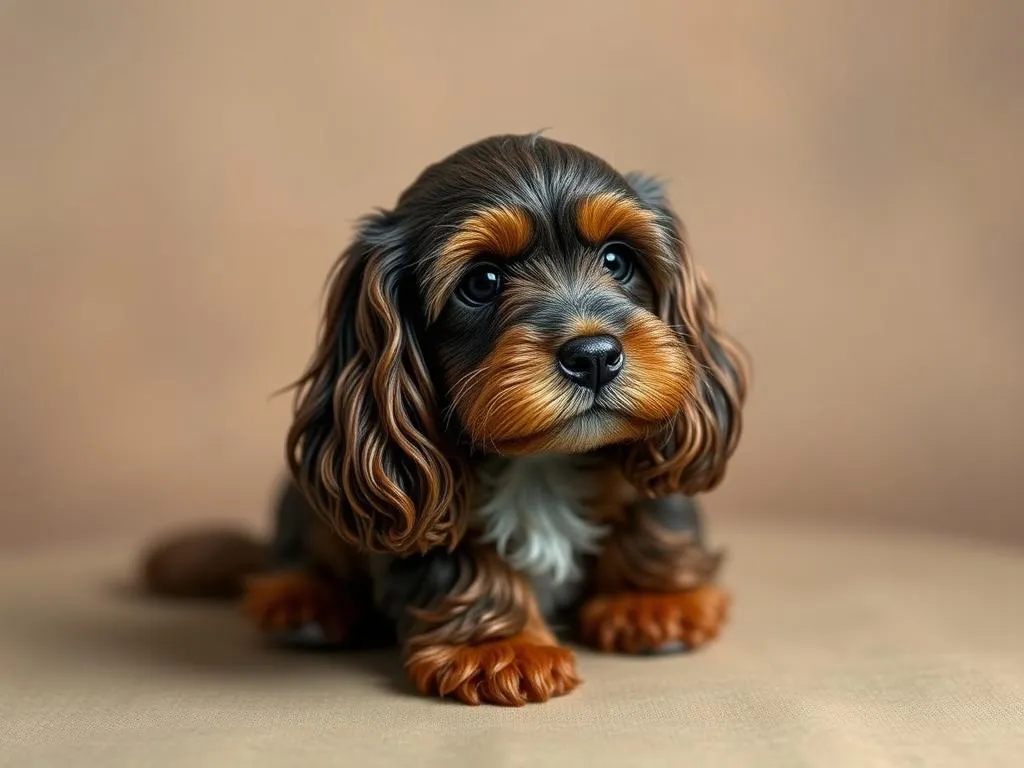
Introduction
Dog breeds are a fascinating aspect of pet ownership, each with its own unique traits, history, and personality. Among the many breeds out there, the Miniature Cocker Spaniel stands out as a beloved choice for many dog enthusiasts. This breed is not only adorable but also comes with characteristics that make it a great companion for families and individuals alike. Understanding the specific traits of the Miniature Cocker Spaniel is crucial for potential owners, as it ensures that they can meet the needs of this delightful breed.
So, what makes the Miniature Cocker Spaniel such a treasured companion? Let’s dive into the details.
History of the Miniature Cocker Spaniel
Origin of the Cocker Spaniel
The lineage of the Cocker Spaniel can be traced back to the spaniels used for hunting in England. Originally, spaniels were bred as hunting dogs, and their ability to flush game made them invaluable to hunters. The term “Cocker” comes from their proficiency in hunting woodcocks. Over time, two distinct varieties emerged: the Standard Cocker Spaniel and the Miniature Cocker Spaniel, with the latter being bred for its smaller size and more compact frame.
Development of the Miniature Cocker Spaniel
The development of the Miniature Cocker Spaniel was largely due to selective breeding practices aimed at producing a smaller version of the Standard Cocker Spaniel. Breeders focused on maintaining the breed’s friendly disposition and hunting instincts while ensuring the new variant retained its compact size. The Miniature Cocker Spaniel gained recognition in various breed organizations, solidifying its place as a beloved companion dog.
Physical Characteristics
Size and Weight
The Miniature Cocker Spaniel typically stands between 12 to 14 inches tall at the shoulder and weighs around 18 to 28 pounds. In contrast, the Standard Cocker Spaniel is larger, standing about 14.5 to 15.5 inches tall and weighing between 24 to 30 pounds. This size difference makes the Miniature Cocker Spaniel an excellent choice for those with limited living space or those looking for a smaller dog.
Coat and Color Variations
The coat of the Miniature Cocker Spaniel is one of its most striking features. These dogs have medium-length, silky fur that can come in a variety of colors and patterns, including:
- Solid black
- Golden
- Roan (a mix of colored and white hairs)
- Merle
Grooming is essential for this breed, as their coat can mat easily. Regular brushing, at least a couple of times a week, is recommended to keep their fur healthy and free from tangles.
Distinctive Features
The Miniature Cocker Spaniel is characterized by its long, floppy ears, which are often covered in silky fur. Their expressive, large eyes give them an endearing look, and their tails are usually docked or left natural, depending on breeding practices. Overall, this breed possesses a friendly and cheerful demeanor, making them instantly likable.
Temperament and Behavior
General Personality Traits
The Miniature Cocker Spaniel is known for its friendly, affectionate, and social nature. They thrive on human interaction and are eager to please, making them relatively easy to train. Their intelligence and adaptability allow them to excel in various environments, from active households to more relaxed settings.
Interaction with Families and Children
As a family pet, the Miniature Cocker Spaniel is often praised for its gentle disposition. They generally get along well with children and can be very playful. However, it’s essential to supervise interactions with younger kids to ensure that both the dog and the children understand boundaries and play safely. Additionally, they are known to coexist peacefully with other pets, provided they are properly socialized.
Potential Behavioral Issues
While the Miniature Cocker Spaniel is typically well-behaved, some common behavioral challenges can arise. Separation anxiety can be a concern since these dogs thrive on companionship. They may also develop a tendency to bark more than other breeds if not trained properly. Early socialization and consistent training can help mitigate these issues, ensuring that your dog develops into a well-rounded companion.
Health Considerations
Common Health Issues
Like all breeds, the Miniature Cocker Spaniel is prone to certain health issues. Common concerns include:
- Hip dysplasia
- Ear infections, due to their long ears
- Eye problems, such as cataracts
Regular veterinary check-ups are vital for early detection and management of health concerns. Preventive care, including a balanced diet and regular exercise, can significantly contribute to their overall well-being.
Lifespan and Aging
The average lifespan of a Miniature Cocker Spaniel ranges from 12 to 15 years, depending on genetics, care, and overall health. As dogs age, their needs may change, requiring adjustments in diet, exercise, and medical care. Senior dogs benefit from joint supplements and potentially a specialized diet to support their health as they enter their golden years.
Care and Maintenance
Dietary Needs
A well-balanced diet is crucial for the health of your Miniature Cocker Spaniel. Recommended diets typically consist of high-quality dog food, rich in protein and healthy fats. Portion control is essential to prevent obesity, a common issue in smaller breeds. Always consult your veterinarian for personalized dietary recommendations.
Exercise Requirements
Despite their smaller size, Miniature Cocker Spaniels require regular exercise to stay healthy and happy. Daily walks, playtime, and mental stimulation are essential. Aim for at least 30 to 60 minutes of activity each day, which can include games like fetch or agility exercises. These activities not only keep them physically fit but also provide valuable bonding time.
Grooming and Hygiene
Grooming is an essential aspect of caring for a Miniature Cocker Spaniel. Regular brushing helps prevent matting and keeps their coat shiny. Bathing should be done every few weeks, or as needed. Additionally, dental care is crucial; regular tooth brushing and dental chews can help prevent oral diseases. Ear maintenance is equally important, as the long ears can trap moisture and debris, leading to infections.
Training Tips
Basic Training Techniques
Training a Miniature Cocker Spaniel can be a rewarding experience due to their intelligence and eagerness to learn. Early socialization is vital, introducing them to various environments, people, and other animals. Positive reinforcement methods, such as treats and praise, work best, as this breed responds well to encouragement. Consistency is key—establishing a routine helps the dog understand expectations.
Advanced Training Opportunities
The Miniature Cocker Spaniel has the potential to excel in advanced training, including agility, therapy, or even service dog roles. Their friendly disposition and willingness to please make them suitable candidates for various training programs. If you’re interested in advanced training, consider enrolling in local classes or seeking out professional trainers who specialize in positive reinforcement techniques.
Finding a Miniature Cocker Spaniel
Responsible Breeders vs. Shelters
When looking to adopt a Miniature Cocker Spaniel, it’s essential to choose a responsible breeder or consider adopting from a shelter. Reputable breeders prioritize the health and temperament of their dogs, providing proper socialization and care. Avoid puppy mills, as they often focus on profit over the well-being of the animals. Shelters and rescue organizations can also be excellent sources for finding a loving companion, giving a dog in need a second chance at life.
Questions to Ask Before Adoption
Before bringing a Miniature Cocker Spaniel home, consider asking the following questions:
- What health testing have the parents undergone?
- What is the temperament of the puppy’s parents?
- Has the puppy been socialized with other animals and people?
- What kind of diet have they been fed?
These inquiries can help you gauge the health and temperament of the dog, ensuring a good match for your family.
Costs and Considerations
The initial costs of acquiring a Miniature Cocker Spaniel can vary significantly depending on whether you adopt or purchase from a breeder. Adoption fees typically range from $50 to $300, while purchasing from a breeder can range from $800 to $3,000. Beyond the initial costs, consider ongoing expenses, including food, grooming, veterinary care, and training, which can add up over time.
Conclusion
The Miniature Cocker Spaniel is a charming breed that offers companionship, affection, and joy to many households. With their friendly personality and adaptable nature, they are well-suited for families, singles, and elderly individuals alike. As potential owners, understanding the needs and characteristics of this breed can lead to a fulfilling relationship. Responsible pet ownership is key to ensuring that your Miniature Cocker Spaniel thrives, both physically and emotionally.
The joy of having a Miniature Cocker Spaniel as part of your family is immeasurable, offering love and loyalty that is hard to match. With proper care, training, and attention, you can enjoy many happy years with this delightful companion.









